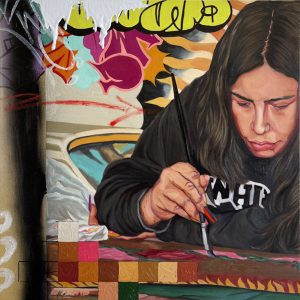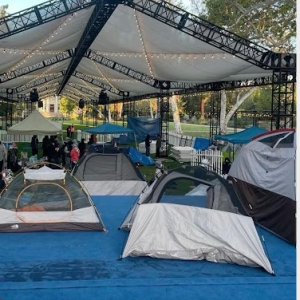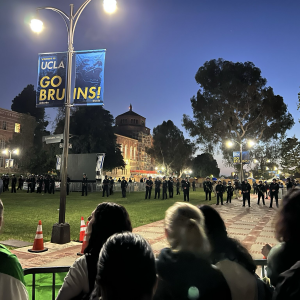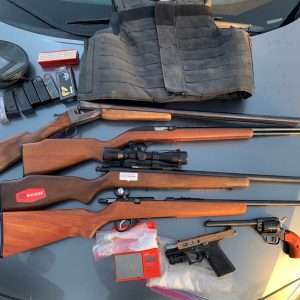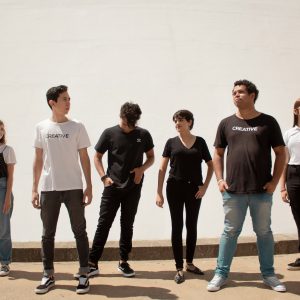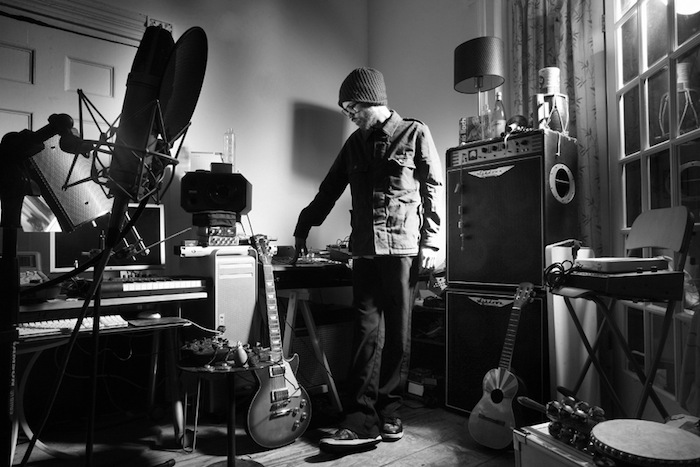 View Winners →
View Winners → 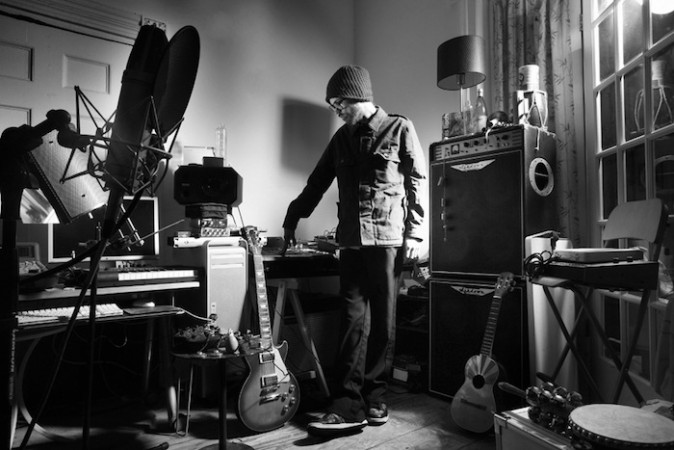
Last Friday, eclectic beat masters Prefuse 73, Falty DL and Nosaj Thing encapsulated and transported the Echoplex’s sonic youth into unearthly dimensions with each of their uniquely branded electronica. The OG of the three — Guillermo Scott Heren aka Prefuse 73 — was the center piece of the triple-act, smoothing out the transition from Falty DL’s dancey, high-energy production to Nosaj Thing’s more spacey version of the type of electronic beats that Prefuse began to explore back in the early 2000’s. Though only in his early 30’s, Prefuse’s subsequent amount of experience and knowledge came from his start in the biz as a teenager, and by the looks of it, he has no intentions of slowing down — especially with the help of some echinacea. Check out the interview below to see how Prefuse survives climate change and taking his music to the grave.
LAC: How’s life?
Guillermo: It’s good, just started this tour yesterday in San Francisco and that was good. It’s a short tour – maybe only seven or eight shows – but we’re going all over the place; we’re like flip-flopping climate wise. It’s crazy, we went from like negative-ten degrees wind chill to San Francisco that was beautiful, like 50 degrees or something and then down here where there’s like, humid heat. Then we’re headed out to Portland which is colder, and from there we hit like Texas which is hot then back to progressively freezing — Chicago, Toronto, New York. And that’s all within ten days so I’m definitely gonna be sick when I get back home (to New York.)
LAC: But I mean, you’ve been going to tours all these years, I would think you’d have a method to surviving the climate madness.
G: Well yeah, you just have to push through it and be positive. But like you said, over the years, you learn how to deal with it and take of yourself. Like, don’t eat a lot of junk, cause that’s what I learned in the past is that over the course of touring, bad diet and stress can totally weigh you down, at least it did for me. I don’t even drink too much anymore when I’m on tour, or smoke weed. As you get older, you get smarter about that type of stuff.
LAC: Tour Survival 101 with Prefuse. (laughs)
G: Yeah, it’s gotten to a point where I make sure I have like, Echinacea and all these preventative medicines with me. And I always Yelp the hotels we stay in so we don’t catch bed bugs, cause those are always a bitch to deal with.
LAC: And here I’m thinking tour life is awesome.
G: I mean, it’s awesome for the 21-year-old that’s never been out of the country. I used to just deal with all the shit that comes with touring, but now I feel like I’m kind of a prude cause I’m always double-checking everything and make sure shit is right; I didn’t use to be like that, I used to just roll with the punches and be sick all the time. I think I’m this way now because I’ve been doing this for half my life and it’s all just habitual now.
LAC: So what do you have going on for 2014, following this really condensed tour?
G: I’m working on a new record and doing a lot of collaborations for my own label. There’s a lot of work right now, and I’m kind of swamped, so the timing for this tour is throwing me off a bit, but this lineup is so sick that’s it’s worth doing. I mean, the tour is only ten days, but when you really think about it, ten days in the studio is priceless because you just don’t know what crazy shit could happen – maybe even three out of the ten days something magical could happen. So when you sacrifice that time to do something, you question it but at the same time it’s like, how often do you get to tour with your homies, with a crew where the vision is similar even though the music is different.
LAC: Over the years, you’ve gone under all these different aliases that aligned with a particular project. Should we anticipate a new alias with this new record?
G: Probably. That’s the way my mind works – I always make aliases. Not to be like, ‘oh, let me over saturate the market with an alias,’ but more like to not be me, so that it’s not to be confused with Prefuse 73 or any other alias I have. It’s just like freedom from the project because aliases should come from a complete idea of concept. You’re just trying to separate from what people are used to – it’s not like a gimmick. You’re doing something with the exact same total amount of passion – you’re excited about it, and aliases are cool because it’s new. You know, you have an idea and you think you can build an album around it and that people will like it, so let me call it something – anything, whatever’s in front of you – and that’s kind of how it happened. So right now I’m in Prefuse 73-mode production-wise but in that process, I could just turn the knob the right way to make an alias happen.
LAC: Has Prefuse 73 always been your center “alias”?
G: Yeah, because I think it’s been the most digest-able stuff I make. Savath and Savalas was really mellow instrumental music, there’s only a certain amount of people that are into that: it had Spanish vocals laced onto it, so (I knew) in the US that wasn’t going to pop off. At the same time Prefuse was the one marketed the most because it aligned a lot better with the other stuff coming out of Warp (Records.) I kept on doing the aliases because I loved making music, I didn’t really care about racking up a whole bunch of dough off of the side projects I had, I just had ideas and wanted to share them. For me, I didn’t make music because I wanted to make millions; I feel like if I were to do that, it would go against my own personal integrity as a musician, and I try to stick to my guns when it comes to the integral part.
LAC: I feel like that’s a standard crossroad any musician comes across: either you get lucky by being able to make your music, hit a target audience and that pops off, or you sell your soul to make millions.
G: You gotta make that decision going into it. I started at a time when I was lucky, I was in the right frame of mind for doing it, I was in front of a lot of people where there maybe remotely five guys that were making the same sounds that I was and that went on for like four years. There wasn’t really anyone for me to compete with, no one for me to really tour with like this – Four Tet may have been the closest one for me to tour with, but even then it was still very different from the stuff I was making.
LAC: Because your music is more hip-hop based.
My shit is so deficit of attention, so many ways for me to play it because I always like to change it up and it comes from a distinct ‘I-grew-up-on-hip-hop’ background, no matter how weird it gets, it still has that similar hip-hop beat. You’re talking about a kid that figured out to work an MPC in a really primitive era, who had a day job at a studio making prehistoric trap beats that hated making them, and out of that Prefuse was born — making trap in Atlanta before even Outkast was blowing up. I hated it, but it was something I had to get experience and learn from. It was what drove me to do something weird.
LAC: How was all that received?
G: I grew up with a whole bunch ‘hip-hop purists’ who hated it. I would play my stuff for my friends and they literally told me that they hated it, so I had to learn how to eat shit for about two years until I got a (record) deal. Nobody was feeling it, but I knew I had to keep at it, I knew it was going to work because it was coming out of me naturally, like it wasn’t contrived. People were so set on this standard formula for a hip-hop beat where you were only supposed to have like 16 bars, a hook, a kick and snare – the weirdest you could get was looping a sample lyric. So what I did was like some obscure part of a sample – like the air in between the rhymes – and make a whole song out of that. I wanted to obliterate this whole system of making a beat and turning into music and letting it mesh – that became the goal for me.
LAC: Do you ever think about what role you’ve played in this whole mashing-up-of-the-genres movement that’s been going on?
G: I leave it up to other people to give me those decorations. I’ll listen though, and see what labels they place upon me, like how they say I invited this genre or whatever, but I’m just whatever about it. There are people in Miami that were hating on me, saying like I’ll never be the best or there are dudes that are way ill-er than me, but I’m not even trying to be the best, I’m just trying to come up with some fresh shit. I recognize that for some of these new producers, I might have taken some weight in a journalistic sense because I was doing these pressing interviews where hip-hop outlets back in the day were saying shit like I’m degrading the role of the MC, and I never understood where that came from because I have the same respect for the MC as much as I do the beat. So I took all these overcomplicated, dead serious shit back in the day and I was able to take all those harsh vibes away from the dudes that do it now; they don’t have to deal with that today. Anybody can make an album, put it on the internet and as long as it’s good, they can pop off and enjoy their life and success, but they don’t have to answer up to a lot of people that I had to, which is a bunch of people that were only listening to two records at a time back then.
LAC: Do you think these new cats look to you as a uhh… I don’t want to say pioneer, because that makes you sound old.
G: Everything makes me sound old. People will call me out like, ‘he’s been in the game for 17 years,’ and I’m just like, “Damn.” Somebody tracked my whole discography all the way back to the records I don’t want anyone to hear. I mean, I’ve been making music since I was 16, but when they call me out like that it makes me sound like, I’m 80. (laughs) I don’t have problems interacting with Nosaj Thing, and I’m not on my death bed, so I don’t understand.
LAC: I would think it’s a respect thing.
G: I would hope so, unless someone’s trying to play me and be like, ‘this old motherfucker.’ I mean, I grew up listening to jazz records from my mom so I see everything from a jazz musician’s perspective – none of those dudes quit, they died making music. These guys died in their 60s-70s-80s, and not to place one over the other, but they weren’t mapping out their careers to call it quits once they make a ton of money. They were making music because they wanted to make music for as long as they could. It seems like everyone I followed in that jazz era just suffered as musicians – they had really high points and really low points and this never stopped them and that’s kind of how I came into it. And when I think about these jazz dudes, they took it to the grave. That’s how I’m going to go out, no matter what I’m making. This shit I’m making is always going to be relevant to me; it’s what I started making, it’s going to be what I’m making no matter what aliases I go under.













